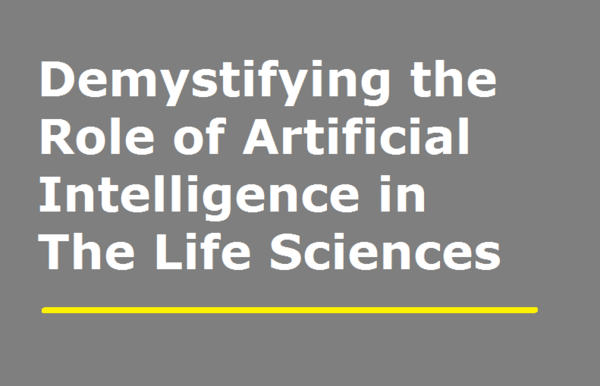[Interview] Applying AI To Shape Business Strategies At European Pharma Organizations
The application of artificial intelligence (AI) in the pharmaceutical industry has become a long-term strategic priority for most companies. However, the efficiency of this endeavor depends greatly on the availability of large volumes of properly curated quality data, which is not always the case.
While pharma organizations generate huge volumes of data across all stages of drug discovery, development, and commercialization, not all types of data are equally useful for building efficient machine learning (ML) pipelines. For instance, it is relatively easier to apply AI-tech to consumer-related business processes, where lots of well-understood and properly labeled data is available, than it is for basic research tasks, where data is complex, often poorly labeled and extremely domain-specific.
The above situation leads to a faster pace of progress with AI application in such areas as financial analysis, consumer-behavior prediction, patient classification, marketing, and so on.
One of the important hurdles that pharma companies are trying to solve using AI tech is brand management. Indeed, understanding peculiar features of various patient categories, their purchasing behaviors, reactions to different products, revealing possible risks and side-effects for each class -- those things become essential for pharma companies to be able to develop and implement truly patient-centric brand management strategies. Luckily, this is one of the most fruitful areas for the application of machine learning (especially deep learning) models.
To get a better understanding of how it can be done, I have asked several questions to Agnieszka Wolk, Senior Director, Data Science, IQVIA, who recently presented this topic at the PMSA 2019 European Summit in Basel, Switzerland. .
 Q: What data is the most valuable in the context of artificial intelligence application, when it comes to building efficient brand management strategies? What channels are used to gather that data?
Q: What data is the most valuable in the context of artificial intelligence application, when it comes to building efficient brand management strategies? What channels are used to gather that data?
A: Efficient and successful brand management requires great attention to all relevant pharma stakeholders: patients, health care professionals, and payors. Respectively, broad and deep data on all three stakeholders are required to build a holistic AI and machine learning (AI/ML) approach. In terms of patients, anonymized longitudinal patient-level data capturing symptoms, diagnosis and treatment captured through EMR, EHR, claims or longitudinal prescription data are the best asset. Social media data can bring additional relevant insights. For health care professionals, data on their patient pool allows for understanding the challenges they are dealing with and data on touchpoints with pharma indicates the stage of engagement. As for payors, a good understanding of market access, clinical benefits, and formulary lists are key. Bringing these together with appropriate brand performance measurement and customized fit-for-purpose AI/ML methods is crucial to achieving success.
Q: What kind of metrics, or data features, are useful to get insights about different patient categories to reveal priority areas for brand management?
A: In terms of data features, it’s very important to have a complete patient history capturing all events including diagnoses, treatments, referrals, lab values, and hospitalizations. Not all single data assets possess all desirable components. AI/ML can help to link the data and fill in data gaps for further analytics.
As for metrics, patient acquisition and patient retention in terms of share of new, switch, repeat and lost patients, as well as persistence measures, are the starting points. AI/ML is needed in the next step to determine and quantify the drivers of different patient pathways. For example, the severity of gastro symptoms before or during dermatology treatment can explain physician treatment decisions, treatment change, and patient compliance. Next, the definition of patient profiles and quantification of patient segments that best benefit from a brand of interest follows. The number of opportunity patients combined provides the Lifetime Value, which should guide the brand management strategy.
Q: How difficult and costly might it be to implement efficient machine learning pipelines to start getting truly actionable insights for brand managers and business analytics teams? Can “out-of-the-box” machine learning solutions suffice for such use cases (e.g.: MlaaS services), or must companies ultimately build ML pipelines from scratch?
A: Implementation of an efficient fit-for-purpose AI/ML pipeline is a very challenging task. It requires significant investment in a good data-management system and technology stack, as well as cross-functional organizational support. Companies lacking the necessary experience may struggle or even fail on this journey. We recommend they should search for help from an experienced partner to ensure success. “Out-of-the-box” MlaaS services or solutions will not directly apply to pharma and would not be sufficient to achieve success in pharma. Given the industry complexities (e.g.: multiple stakeholders, regulations, complex data structure, data privacy laws, etc.), pharma needs to develop their own fit-for-purpose customized AI/ML solutions based on strong domain knowledge that will meet high-quality standards.
Q: What is the current situation in the pharmaceutical AI market in Europe? How active are European drug markers when it comes to AI adoption, in particular for brand management?
A: There is a significant amount of interest in AI/ML among pharma companies who have started to realize the potential benefits from efficiencies, precision insights, and recommendations generated through AI/ML. However, life science companies are all at very different stages of AI adoption. Some companies are just in the discovery process trying to understand requirements, application areas and tangible benefits from AI/ML. Others have finalized successful proofs-of-concept and have made significant investments to rollout the AI/ML-based solutions. Compared to 2018, there has been clear advancement in AI adoption among all market players. However, this process is still relatively slow in healthcare as compared to other industries.
Q: How to deal with tightening data privacy regulations across the globe? Do you see substantial barriers to AI adoption by pharma, related to data privacy concerns?
A: Healthcare is an extremely sensitive industry. It requires well thought out and defined data privacy regulations in place to assure the security and confidentiality of patient records. Surely, pharma will not operate the same business model as for example Amazon, Netflix or financial services that know their customer's transaction history on a nominative level and can send personalized recommendations directly to their users. However, this should not prevent pharma from adopting AI/ML as quickly as possible. There are a great number of different AI/ML application opportunities that—with alignment to data privacy regulations and ethical standards—can deliver great value to patients, physicians and payers and drive pharma success. For example, clinical decision support systems developed based on anonymized patient-level data in cooperation with multiple life science companies can support the right treatment for the right patients.
Topics: Industry Trends Emerging Technologies



Comments:
There are no comments yet. You can be the first.
Leave a Reply cancel reply
Your email address will not be published. Required fields are marked *